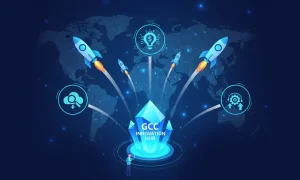Business growth is one of those topics that every entrepreneur, founder, and CXO loves to talk about. But behind all the glossy boardroom charts and the corporate pep talks lies a harder truth – scaling a team across geographies is messy, expensive, and often riddled with mistakes. The question then becomes: how do global enterprises manage to grow at breakneck speed while keeping costs in check and innovation pipelines flowing?
One answer that has stood the test of time is the Global Capability Center, better known as the GCC.
For years, GCCs have quietly powered the global ambitions of Fortune 500 giants, ensuring they expand faster, operate smarter, and innovate continuously. But the story doesn’t end with the big corporations. Increasingly, small and medium enterprises (SMEs) and startups are also waking up to the fact that GCCs are no longer optional luxuries but the operating engines of global growth.
What Exactly is a GCC?
In the strictest sense, a global capability center is a wholly owned extension of a company’s core team, usually set up in cost-effective, talent-rich geographies like India, the Philippines, or Poland. Think of it as a company within a company. It mirrors the parent’s vision, culture, and goals, but focuses on specialized functions such as product engineering, AI, data analytics, cybersecurity, finance, or even customer experience.
Over the last two decades, GCCs have evolved from being mere transactional “back offices” to becoming centers of excellence. Today, they co-own global products, drive digital initiatives, and sometimes even set the innovation agenda for the parent enterprise. Ask industry leaders like Microsoft, Google, Walmart, or Goldman Sachs, and they’ll point you toward their sprawling GCC footprints as proof that this operating model is indispensable.
The GCC Advantage in Scaling

Scaling a team globally is not just about hiring more people. It’s about creating an operating model that allows an organization to absorb complexity while still delivering speed and innovation. GCCs are uniquely positioned to make this possible.
For starters, GCCs allow enterprises to tap into global talent pools without being restricted to one geography. A brilliant AI engineer might be sitting in Kochi, a data scientist in Kraków, and a customer experience specialist in Cebu. With the GCC model, all of them can contribute to one company’s vision without relocating or compromising productivity. This “talent without borders” philosophy is one of the biggest reasons GCCs have become magnets for ambitious global teams.
Secondly, GCCs bring scalability without friction. Instead of waiting through endless recruitment cycles in expensive Tier-1 markets, organizations can leverage staff augmentation within their GCC framework. Need a team of cybersecurity experts overnight? A GCC can make that happen. Need to ramp up design and UX capabilities for a new app launch? The GCC is the tap that pours talent when needed.
And finally, GCCs optimize costs without compromising quality. Traditional scaling usually means ballooning real estate costs, HR overheads, and higher attrition risks. A GCC global capability center in India or the Philippines cuts all of that down while still providing world-class infrastructure and governance.
Why India Leads the GCC Wave
It’s impossible to talk about GCCs without highlighting India. The country hosts over 1700 global capability centers, employing more than 2 million professionals across industries. From technology and banking to retail and healthcare, global corporations rely on their Indian GCCs to not only run operations but also fuel innovation.
The rise of the GCC global capability center India story is not accidental. With abundant talent, cost advantages, and a thriving ecosystem of advisory firms, India has positioned itself as the epicenter of the GCC boom. Whether it’s a Fortune 500 enterprise or an ambitious SME, India offers the perfect playground to set up a GCC that delivers both scale and quality.
GCCs as Innovation Engines

If you thought GCCs were just about low-cost operations, think again. The new-age GCC is as much about intellectual property and innovation as it is about efficiency. Take a look at how global enterprises leverage their GCC setups today:
- Microsoft’s Indian GCC is not just running support but developing proprietary software.
- Global banks are tasking their GCCs with building AI models to detect fraud.
- Retail giants are using their GCCs to experiment with predictive analytics for customer behavior.
The story is the same across industries. GCCs are no longer the silent engines. They’re becoming the innovation hubs that shape the future of their parent enterprises.
The Road Ahead
The global GCC market is projected to hit $105 billion by 2030. That’s not just a statistic. It’s an indicator of where the future of global team growth lies. As enterprises chase agility, speed, and innovation, GCCs will only grow more critical.
In India alone, the momentum is unstoppable. With hundreds of global capability centers in India scaling their operations, and newer entrants setting up shop every year, the country is cementing its place as the heartbeat of the GCC ecosystem.
Conclusion
Scaling doesn’t have to be chaotic. With the GCC strategies available today, enterprises can expand faster, smarter, and cheaper than ever before. Whether you’re a multinational giant or an SME hungry for global relevance, the GCC model ensures that you can scale without stumbling.
The takeaway is simple: scaling is no longer about building bigger. It’s about building smarter. And in that quest, GCCs are the secret weapon that supercharges global team growth.



